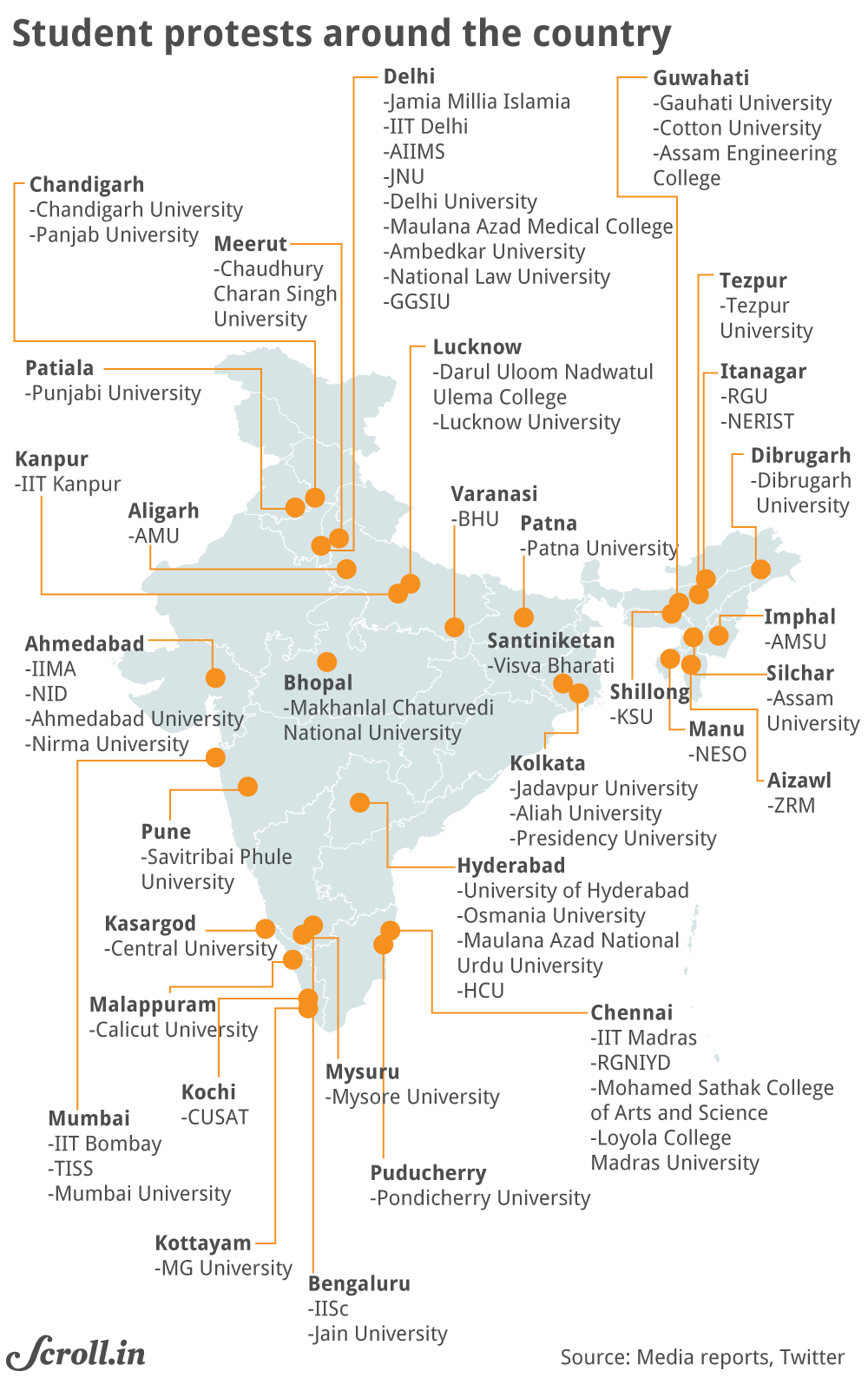Over the years, Prime Minister Narendra Modi and Home Minister Amit Shah have often called for a “Congress-mukt Bharat”, an India free of the Congress. Moving towards this goal, they have reduced the party to historic lows in two consecutive Lok Sabha elections. Yet, after a week in which protests against the Citizenship Amendment Act exploded organically around the country, both Shah and Modi seemed keen to pin all the blame on the Congress.
“One hundred per cent Congress is behind these protests,” said Shah on Tuesday. Said Modi on the same day, “The Congress is spreading lies, creating an atmosphere of fear for Muslims over the Citizenship Act.”
Taken at face value, their comments are curious because almost nobody would credit the Congress with machinery to be able to coordinate protests around India against the controversial Act.
The law makes it easier for non-Muslims from Pakistan, Bangladesh and Afghanistan to become Indian citizens even if they are illegal immigrants. But because it adds a religious criteria to the citizenship law, there have been fears that it will be used to harass Indian Muslims, especially if combined with an all-India National Register of Citizens.
After the law’s passage in Parliament last week, protests erupted around the country. Beginning in the North East, where it is feared that the law will lead to large-scale demographic changes, the agitations spread to college campuses around the country, leading in some cases to violence because of heavy-handed police responses.

It was only after this that political parties came on board, with massive rallies organised by the Left, the Trinamool Congress and the Dravid Munnetra Kazhagam. Even then, the Congress mostly played second fiddle, joining with the Communist government in Kerala and making a small appearance at India Gate among other things.
Where the political parties have been more influential has been in their insistence that they will not allow the Citizenship Amendment Act to be implemented in their states (even if that may not be technically possible).
- West Bengal’s Mamata Banerjee took the lead by decrying the Act, saying her government would stand in the way of an NRC and also halting work on the National Population Register, the first step towards creating a register of citizens.
- Echoing this was Kerala’s Communist government under Pinarayi Vijayan, as well as the Congress-led governments in Madhya Pradesh, Punjab, Chhattisgarh and Puducherry.
- Delhi Chief Minsiter Arvind Kejriwal, of the Aam Aadmi Party has voiced his opposition to the Act, saying his first responsibility is to current Indian citizens not those of other countries.
Even the Bharatiya Janata Party’s own allies have expressed reservations about its willingness to bring in this divisive law, and follow it up with an NRC process that many fear will be a tool to harass Muslims.
- The Asom Gana Parishad, the BJP’s chief partner in Assam, after voting for the Act in Parliament, has done a u-turn and will now not only oppose it but is also party to the legal challenge against the law in the Supreme Court.
- The Janta Dal (United), the BJP’s chief partner in Bihar, saw a rather public disagreement among its leaders over the party’s support for the Act in Parliament, followed by an assertion that an NRC would not be extended any support.
- The Shiromani Akali Dal, the BJP’s chief partner in Punjab that also voted for the Act in Parliament, has called again for Muslims to also be added to the Citizenship Act – something the Amit Shah dared the Congress to call for.
- The All India Anna Dravida Munnetra Kazhagam, the BJP’s senior partner in Tamil Nadu, voted for the Act in Parliament but has seen debates over this support, with one Member of Parliament saying that he had reservations about the Act and that Shah wanted to turn India into a Hindu state.
- The Biju Janata Dal, which is not an ally of the BJP but has supported many laws in Parliament including this one, said it would not permit an NRC to be implemented in Odisha where it is in power.
While many questions can be asked of these parties and why they supported the legislation’s passage in Parliament – only to come out against it when the public took to the streets – it is more important that the BJP listens to these voices.
Clearly unlike previous controversial policy moves, whether it was demonetisation or the revocation of Jammu and Kashmir’s special status under the Constitution, the public, the Opposition and even the party’s own allies are not on board for this attempt to add a religious criteria to Indian citizenship laws.
For a government that promises to take everyone on board – always a dubious motto but the officially stated one nevertheless – it is important that Modi and Shah take a look at the overwhelming turnout against their policy moves, rather than simply insisting that it is all the Congress’ doing.
NRC(नेशनल रजिस्टर ऑफ़ सिटीज़न्स) से सरकार फिलहाल पीछे हट रही है.
— Milind Khandekar (@milindkhandekar) December 19, 2019
अख़बार में छपे विज्ञापन में सरकार ने कहा है कि किसी राष्ट्रव्यापी NRC की घोषणा नहीं की गई है. अगर कभी हुआ भी तो नियम ऐसे बनेंगे कि भारतीय नागरिक परेशान ना हो.
अब तक अमित शाह कह रहे थे कि पहले CAB होगा फिर NRC. pic.twitter.com/OTH4jsDuSM
A start would be stepping back from announcing a nation-wide NRC, despite Shah promising it incessantly – as the advertisements above seem to suggest the government may be doing. But the bigger takeaway from the whole affair would be some introspection on policy priorities and presumptions about what its massive electoral mandate from earlier this year actually meant.
Limited-time offer: Big stories, small price. Keep independent media alive. Become a Scroll member today!
Our journalism is for everyone. But you can get special privileges by buying an annual Scroll Membership. Sign up today!